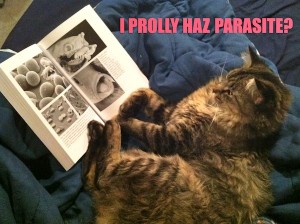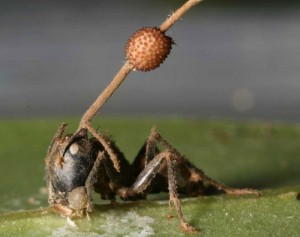I’ve recently suggested that parasites can be our friends, with special reference to Bill the Mathematician’s quest to become infected with hookworm.
 Now I see a member of the Bangkok Writers’ Guild has posted a reference to a story I’d filed some time ago among notes regarding neuro-parasites (“Zombie ants have fungus on the brain”).
Now I see a member of the Bangkok Writers’ Guild has posted a reference to a story I’d filed some time ago among notes regarding neuro-parasites (“Zombie ants have fungus on the brain”).
“Tropical carpenter ants (Camponotus leonardi) live high up in the rainforest canopy. When infected by a parasitic fungus (Ophiocordyceps unilateralis) the behaviour of the ants is dramatically changed. They become erratic and zombie-like, and are manipulated by the fungus into dying at a spot that provides optimal conditions for fungal reproduction.”
My file contains lots of stuff on how parasites have evolved in ways allowing them to affect the behavior of their hosts, essentially steering them towards folly that benefits the parasites no end. Most interesting, to me, is the possibility we humans ourselves are being piloted by parasites.
A couple of years back, I’d enjoyed a Scientific American article and slideshow entitled “Zombie Creatures: What Happens When Animals Are Possessed by a Parasitic Puppet Master?” I was especially intrigued by following item:
“A parasite that lives to change mouse behavior might also be altering the way humans act. The parasitic protozoa Toxoplasma gondii thrives by cycling through feline and rodent hosts. When it infects mice, the brain-dwelling parasite makes them more daring and, in particular, less afraid of the scent of cats (so it can get passed back to the feline hosts when they eat the infected, emboldened rodents).
The chemical changes brought on by the parasite appear to have some of the same effects on humans, who can be infected by ingesting parasite eggs from cat feces. Research by Kevin Lafferty, a research ecologist with the U.S. Geological Survey, has found that the parasite can cause women to act more moralistically, and men less so. And “when looking at human societies, those traits correlated pretty well with the prevalence of T. gondii infections,” Levri says. Other research has shown a higher incidence of risky behavior in people who are infected.”
 “Cat and Mouse,” caption from Scientific American online slide show (6 of 6)
“Cat and Mouse,” caption from Scientific American online slide show (6 of 6)
Unsurprisingly, people such as Carl Zimmer, author of Parasite Rex and A Planet of Viruses, were way ahead of me in these matters. Here’s something from Zimmer’s “The Return of the Puppet Masters” (January, 2006):
“… the idea that parasites are tinkering with humanity’s personality–perhaps even giving rise to cultural diversity–is taking over my head like a bad case of Toxoplasma.”
 More recent comments from Zimmer’s blog, The Loom, on these and a variety of other parasites, include a report on the above-mentioned cat parasite that may infect human individuals and affect their subsequent behavior.
More recent comments from Zimmer’s blog, The Loom, on these and a variety of other parasites, include a report on the above-mentioned cat parasite that may infect human individuals and affect their subsequent behavior.
Then I came across an article in which Gloria Maender pursues similar questions, asking what effects this parasite might have on whole cultures “Cat Parasite May Affect Cultural Traits in Human Populations” (September 2006).
It occurs to me that these trains of thought lead us even further: might we one day discover that the human condition writ large serves the interests of some so-far unidentified parasite. Who’s driving the bus, eh? Does Fate reflect a wormish agenda?
It’s fun to speculate. Stay tuned for fables I’d spun even before I saw Maender’s story.


In the DPRK we know what to do with parasites. We stand them up and shoot them, as their spouses, parents and children along with all their neighbors watch. The cat feces method is waaaaaaayyyy too indirect.
I suspect this rodent might have a bad T. gondii infection: http://www.dailymail.co.uk/news/article-1190772/What-squeak-Daring-mouse-whos-boss-scares-leopard-steals-lunch.html
And this from Jeff the Giant Anthropologist:
More parasites in the news… Must be something in the air.
http://www.economist.com/blogs/buttonwood/2011/08/wealth-creation-and-macroeconomics?fsrc=nlw|newe|08-31-11|new_on_the_economist
Steve Hyde: Reminds me of those tourists that have been taken over by their backpacks… theyre also known to fearlessly approach dangerous beasts
Collin Piprell: Excellent observation. Now we need a scientific name for the dread backpack neuro-parasite.
Collin Piprell: The Lonely Planet guides and suchlike may well also function as parasites. They infect innocent folk sitting in armchairs at home with the idea they must go out and — antlike or, perhaps, zombie-like — journey well-worn paths trodden by others so afflicted and, in doing so, reinforce the power of the “books” and contribute to their continuing proliferation. These tourists are vectors for the spread of the parasites, but the lands and cities they describe are their real hosts. These host destinations soon become debilitated, of course, drained of their color and life, so the parasitical books keep mutating and infected yet further shores, spreading their promise of secure vector nodes and cheap cottage cheese everywhere. Scary, no?